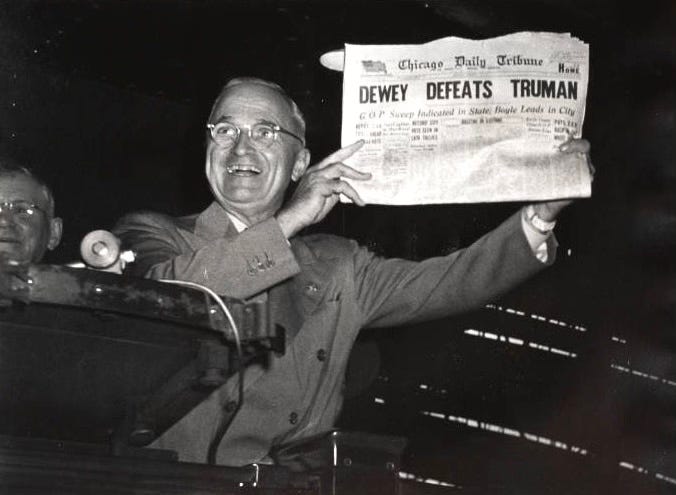President Barack Obama famously stated after his 2008 win, “Elections have consequences”. Indeed they do. One of the fun pastimes of historians and political scientists is to speculate on what would have happened had key presidential elections gone in the other direction.
The presidential election of 1948 is one such campaign. Despite all odds (and every poll), Vice President Harry Truman defeated moderately conservative Republican Thomas E. Dewey, the Governor of New York. The Democratic Party was extremely divided at the time and some party bigwigs had tried to recruit World War II hero Dwight Eisenhower to be the Democratic nominee in 1948—in place of Truman. We all know what happened with “Ike” four years later.
On the policy front, not very much in a Dewey Administration would have differed from what Truman delivered. Certainly Dewey would offer less emphasis on the social programs of the New/Fair Deal, more emphasis on a balanced budget and a more aggressive stance against communism around the world. The practical result would likely have been an earlier entry into the Korean War—and an un-chained General Douglas MacArthur.
But an even more profound impact of a Dewey victory might have been surrounding his running mate—Earl Warren, Governor of California. Would Warren have ridden the Vice Presidency to his own victory in 1956 (assuming a Dewey re-election)? Would Warren never have become Chief Justice of the U.S. Supreme Court? Would there never have been the consequential rulings of the Warren Court on civil rights (Brown v. Board of Education), privacy rights (Griswold v. Connecticut), right to legal representation (Miranda v. Arizona)—and many other landmark rulings? Certainly, American democracy would look quite different without Warren’s leadership on the High Court.
So, just a 2 million vote shift in the 1948 presidential election could have dramatically altered the course of our country over the last 75 years.



